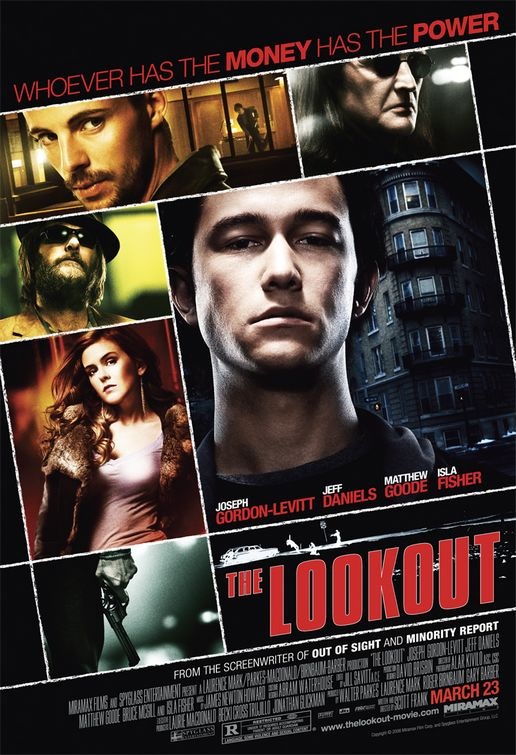
Heist movies are rarely about anything other than the con, but Scott Frank’s “The Lookout” is a slightly different beast, a character driven piece where how the crime changes the lead character is far more interesting than the mechanics of the job itself.
Joseph Gordon-Levitt plays Chris, a high school kid who had it all, until a car accident left him brain damaged. Chris has memory problems similar to, but not to the severity of Guy Pearce’s character in “Memento.”
Where Pearce couldn’t create new memories, Levitt’s Chris has difficulty sequencing them and gets easily confused. Chris also has difficulty controlling his anger and has lost his inhibitions, which leads him to say things like “I want to see you naked” to women.
Chris works alone as a night janitor at a bank something that small time hood Gary Spargo (Matthew Goode, “Match Point”) notices. Gary baits Chris with the attractive former striper Luvlee Lemons (Isla Fisher, “The Wedding Crashers”) and convinces him to help with a bank robber.
Frank, making his directorial debut from his own script, has adapted Elmore Leonard’s “Out of Sight” and “Get Shorty” for the screen and the unique rhythm and flavoring of Leonard’s dialogue and storytelling is captured here. But Frank’s film doesn’t feel like a rip-off and that’s largely due to the freshness of the central character.
There’s a quiet intensity permeating through the whole film but for the most part it is not driven by the plot. Too often films in the heist genre are overly focused on labyrinthine plots and a surprise twist, which is all fine and well, but Frank has admirably but his focus on character.
Gordon-Levitt, who in the 90s was more known for his comic skills on the show “3rd Rock from the Sun,” has developed into intense dramatic actor. Following his work in last year enigmatic thriller “Brick,” Gordon-Levitt is proving himself to be the go to man for dark, complicated protagonists.
Chris is a complex, conflicted character, a bundle of confused emotions trying to sort everything out and Gordon-Leavitt balances all these difficult emotions in a way that is believable. He never allows the character to become a gimmick or mere plot point and infuses him with a wealth of turmoil that is rarely directly addressed but always there.
Jeff Daniels’ Lewis, Chris’ blind roommate and best friend, gives the film some of its only levity. The character does spout wisdom, but Daniels and Frank keep him from being more than just a blind wiseman. Lewis playfully flirts with a waitress at the same time he offers warm, humor filled support to Chris.
It is a performance that reminds you how likable and charming a performer Daniels is. Chris and Lewis’ friendship has nice flow to it and their scene help deepen the film emotionally and thematically.
Goode, an English actor hiding his accent well, is appropriately hard and grungy as Gary, but as he’s conning Chris, Goode manages to add at least a flickering note of compassion. Gary is asthmatic, which gives him the oddly menacing crutch of taking hits from his inhaler. Although Gary is the film’s bad guy, Goode keeps it low key and avoids hammy villainy.
In terms of acting Fisher’s femme fatale is the only weak link. Fisher showed chaotic comedic energy in “The Wedding Crashers,” here she seems dull and uninteresting, but that could be due to the script, which drops her when she is no longer useful to the plot. In a script that is intelligent and clever without being glib, it is the only disappointing aspect.
Frank as a director isn’t showy and the pace is leisurely, but rewarding. It is 45 minutes before the robbery is even mentioned, but Frank takes that time to create a world that is more fully realized than most films of the genre. The ending may be a bit too neat, but satisfying stems from a natural progression of the story. Maybe that in itself is the film’s big twist.

No comments:
Post a Comment